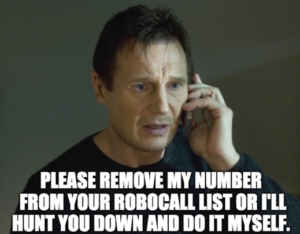The Hooker Indian Society and Robo Calls
My phone service requires me to include an area code whenever I call someone. When I dialed a local fabric store to inquire about an order, I fat-fingered the numbers, dialing 801 instead of the store’s area code 804.
Upon hearing an answering machine’s robotic “No one is available to take your call,” I realized my mistake. Without leaving a message, I hung up. I dialed the correct number and conducted my business with the very polite Cherisse at the fabric store.
A few minutes later my phone rang. Seeing area code 801 displayed on my phone, I assumed it must be the person from Utah curious about who would be calling from the area code designated for Virginia. Conditioned by receiving undue numbers of robocalls every day, mostly from Alice at the warranty department, I ignored the call. I reasoned, as it turned out incorrectly, the person would recognize my call for what it was, a misdial, and hang up.
Was it rude of me to not answer and explain my error?
Later that day I checked my voice mail and got an earful: “You called the Hooker Indian Society. I was wondering why the [UGLY WORD] you called me. You sound like a female.” The woman’s tone conveyed paranoia and enraged indignation at my audacity to intrude upon her business under false pretenses.
According to the Federal Communications Commission (FCC), Americans received an estimated 2.4 billion robocalls each month in 2016, that’s about 30 billion unsolicited calls a year. Unfortunately, the FCC and service providers’ efforts to prevent the unwanted intrusions have been outpaced by the slick entrepreneurs who continue to come up with ways to pique our collective curiosity enough to answer the call. And when we do, telemarketers demand our credit card and social security numbers least the warranty on the car expires or the IRS threatens to repossess the living room furniture and incarcerate our first born.
Like Ms. Hooker Indian Society, we’ve all been victims of phone abuse and held hostage in our own personal space. Receiving unsolicited calls, some bordering on harassment, is frightening. Seemingly credible threats and our inability to do anything about them leave us all feeling vulnerable and powerless.
Perhaps this is why the movie Taken is so popular. Upon receiving an anonymous call which threatens everything dear to him, Liam Neeson’s character Bryan Mills seeks and exacts revenge.
Oh, if only we mere mortals could do the same with robots and rude strangers on the other end of the phone connection.








